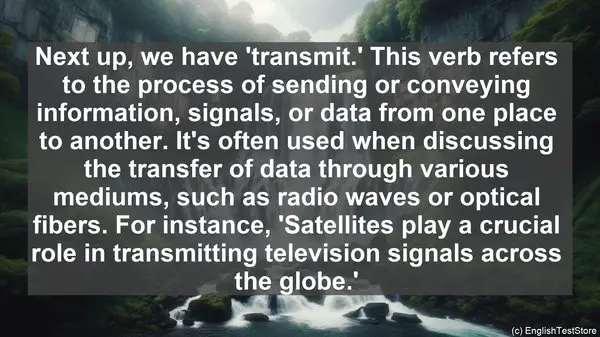Introduction
In today’s lesson, we’ll be exploring the world of global connectivity and telecommunication advances. As students, it’s crucial to have a strong grasp of the English language, especially when discussing these topics. To help you with that, we’ve compiled a list of the top 10 English verbs that are frequently used in this context. Let’s dive in!
1. Connect
The first verb on our list is ‘connect.’ This verb is used to describe the establishment of a link or communication between two or more devices, networks, or individuals. For example, ‘The new fiber-optic cables will connect remote areas to the internet, bridging the digital divide.’
2. Transmit
Next up, we have ‘transmit.’ This verb refers to the process of sending or conveying information, signals, or data from one place to another. It’s often used when discussing the transfer of data through various mediums, such as radio waves or optical fibers. For instance, ‘Satellites play a crucial role in transmitting television signals across the globe.’
3. Access
The verb ‘access’ is all about being able to reach or retrieve something. In the context of global connectivity, it’s often used to describe the ability to connect to the internet or other networks. An example sentence could be, ‘With the increasing availability of public Wi-Fi, more people can now access online resources from anywhere.’
4. Stream
When we talk about watching lessons or listening to music in real-time without downloading them, we use the verb ‘stream.’ It’s commonly associated with platforms like YouTube, Netflix, or Spotify. For example, ‘Instead of downloading a movie, you can simply stream it on your device.’

5. Share
In the age of social media, the verb ‘share’ has gained immense popularity. It’s used to describe the act of distributing or making something available to others, often through online platforms. For instance, ‘You can share the document with your colleagues by sending them the link.’
6. Collaborate
When multiple individuals or groups work together on a project or task, we use the verb ‘collaborate.’ In today’s interconnected world, collaboration often happens remotely, thanks to various digital tools. An example sentence could be, ‘Through lesson conferencing, teams can collaborate effectively, even if they’re in different time zones.’
7. Update
The verb ‘update’ is frequently used when discussing software, applications, or even news. It refers to the act of making something more current or bringing it up to date. For example, ‘Make sure to regularly update your antivirus software to protect your device from the latest threats.’

8. Monitor
When we want to keep a close watch on something, we use the verb ‘monitor.’ In the context of connectivity and telecommunication, it often refers to observing the performance or status of a network or system. An example sentence could be, ‘Network administrators constantly monitor the server to ensure its smooth operation.’
9. Expand
The verb ‘expand’ is all about growth and enlargement. In the realm of connectivity, it’s used to describe the process of extending the coverage or reach of a network or service. For instance, ‘The company plans to expand its 5G network to more cities in the coming months.’
10. Innovate
Last but not least, we have ‘innovate.’ This verb encapsulates the spirit of progress and invention. In the fast-paced world of technology, constant innovation is key. An example sentence could be, ‘Companies invest heavily in research and development to innovate and stay ahead of the competition.’
